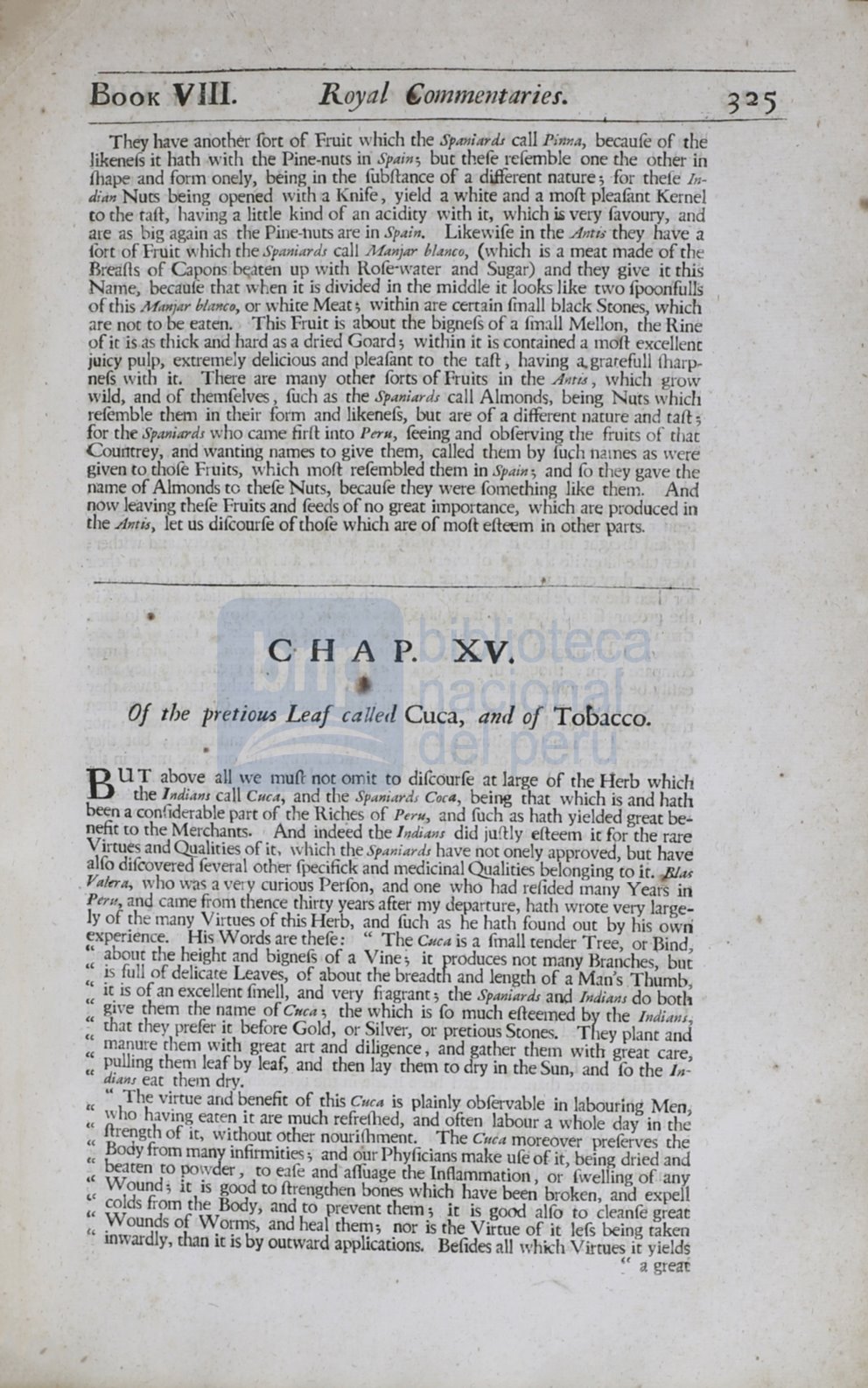

BooK
VIII.
Royal
~ommentaries
.
.
They
have another fort of Fruit
~1vhich_
the
Spaniard.!
call
Pinna,
becau[e of
tl:e
Jikends
it
hath with the Pine-nuts m
Spam;
but thefe refemble one the other m
fuape
and form onely, b
eing inthe .
fubft~nce
of a
~iffereot
nature; for thefe
In–
dian
Nuts being opened
wi.cha Kmfe,
_Yt~lda
_wh~te
and. a 1!1oft pleafunt Kernel
to
the raft, having a littl
e kmdof
a~
ac1d1.tyw1~h
1t,. wl;ich
LS
ve~
favoury, and
are as big again as the Pine-nuts are
m Sp~m.Likew1f~
m
~he
A ntu
·they have a
fort of Fruit which the
Spaniards
call
Manpzr blanco,
(which 1s a meat made of the
Brea!ls of Capons beaten up with Rafe-water and Sugar) and they give it this
Name becaufe that when it
is
divided in the middle it looks like
mro
fpoonfulls
of this'
M anjar blanco,
or whire M.
~at;
within
ar~
certain fmall black St-ones
1
wh~ch
are not to be eaten. This
Fruit
IS
about the b1gnefs of a fmall Mellon, the
Rme
of it
is
as thick and hard as a dried Goard ; within
it
is contained a moft excellem:
juicy
pulp, extremely delicious and pleafant to the .raft., having
~ grate~ull
fharp...
nefs
with
it. There are many other forts of Fruits m the
A ntu,
whteh
grow
wild, and of themfelves, fuch as the
Spaniards
call Almonds, being Nuts which
refemble them in their form and likenefs, but are of a different nature and tafi ;
for the
Spaniards
who came
firll:
into
Peru,
feeing and obferving the fruits of that
Courttrey, and wanting names to give them, called them by
fuch
names as were
given
to
thofe Fruits, which mofl: refembled them in
Spain;
and
fo
they gave the
name of Almonds to rhefe Nuts, becaufe they were fomething like them. And
now leaving rhefe Fruits and feeds of no great importance, which are produced in
the
A11tu,
let us difcourfe of thofe which are of mo
ft
efteem in other parts.
CH AP.
xv.
Of the pretious Leaf called
Cuca,
and
of
Tobacco.
B.
UT above all we mufr not omit to difcourfe at large of the fterb
whicl-i
the
Indians
call
Cuca,
and the
Spaniards
Coca,
being that which is and hath
been a conftderable part of the Riches of
Peru,
and fuch as hath yielded great be–
nefit
to
the Merchants. And indeed the
Indians
did jufl:ly efi:eem
it
f9r the rare
Virtues and
~alities
of itl which th_e
Spaniards
have not onely approved, but have
alfo difcovered. feveral
oth~
fpecifick and medicinal Qualities belonging to
it.
Pl~
P'alera,
who was a very curious Perfon, and one whonad refided many Years
in
Peru,
and came from thence thirty years after
my
departure, hath wrote very large–
ly of the many Virtues of this Herb, and fuch as he hath found out by his owri
experience. His Words are thefe:
" The
Cuc
a
is a fmall tender Tree, or Bind
'' about the height and bignefs of a
Vine~
it
produces not many Branches,
bu~
::
~full
of delicate Leaves, of about the breadth and length of a Man's Tbumbj
it
IS
of an excellent
finell,
and very fragrant ; the
Spaniards
and
Indians
do both
cc
give them the name of
Cuca;
the which is fo much elteemed
by
the
IndianI
~'
that they prefer it before Gold, or Silver, or precious Stones. They plant and
" manure them with great art and diligence, and gather them with great care
:: pulling them leaf by leaf, .and then lay them to
dry
in the Sun, and
fo
the
In~
dian1
eat them dry.
"
~
The
v~rtue
and
~enefit
of this
Cuca
is
plainly obfervable in labouring
Men;
who havmg eaten
it
are much refrefhed, and often labour a whole day in the
:: firength of
it,
w~thout ?~her
nourHhment. .The
Cuca
moreover preferves
the
cc
Body from many mfirm1ues; and our Phyfic1ans make ufe of it, being dried and
,, beaten to
po~vder,
to eafe and a!fuage the
~flammation,
or [welling of
any
,, Wound; it is good to firengthen bones which have been broken, and expell
" colds from the Body, and to prevent them;
it
is good alfo to cleanfe great
t
yYounds of Worms, and heal them; nor is the Virtue of
it
lefs being taken
' mwardly,
than
it
is
by
outward applications. Befides all
whkh
Virtues
it
yields
~c
a great














